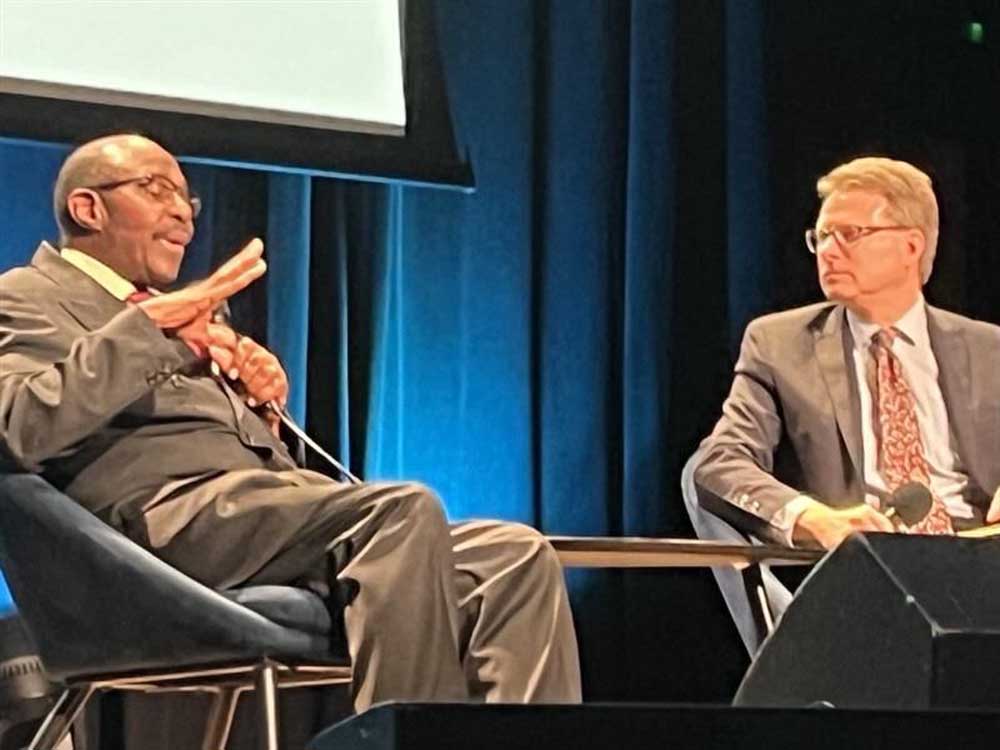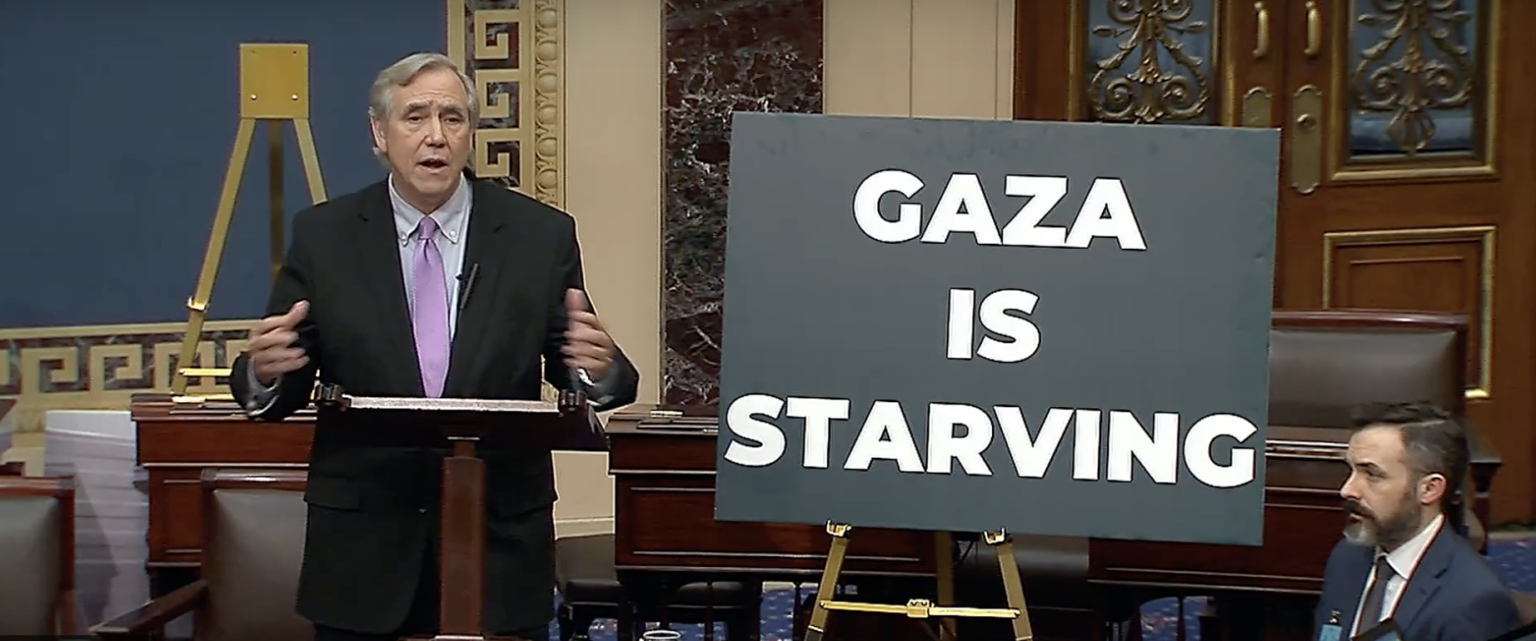The inspiration for ‘Hotel Rwanda’: ‘Don’t close your eyes’
Published 2:00 pm Friday, June 21, 2024

- Paul Rusesabagina makes a point to Derrick Olsen, World Oregon president, during a discussion on June 10 at an event at Revolution Hall in Portland.
Paul Rusesabagina offered simple advice about the 1994 genocide in Rwanda, where he is credited with saving more than 1,200 lives in his hotel, and his more recent imprisonment based on his criticism of human rights violations by that African nation.
Trending
He told a World Oregon audience in Portland on the 30th anniversary of that genocide: Do not remain silent.
“My message is simple: Whenever you see people in danger, do not forget to talk about them,” he said during a June 10 appearance at Revolution Hall in the final talk of the 2024 International Speaker series.
“The very time you become silent, they will be forgotten. If you raise your voice and talk, by all means, the message will save their lives.”
Trending
The world was silent three decades ago about the events in Rwanda. But Rusesabagina said there is ample time for the United States and the European Union, among others, to speak up about the exploitation of workers mining minerals vital to high-tech devices such as smartphones in the Democratic Republic of Congo — and the complicity of neighboring Rwanda and Uganda in that trade.
The worst thing, he said, is “to close your eyes and ears and pretend not to see or hear what is happening. The world should not close its ears and eyes. The would should open its eyes and see what is going on in the Congo, where Rwanda and Uganda have invaded that country.”
Now 70, Rusesabagina spoke about the 1994 events, which were depicted in the 2004 movie “Hotel Rwanda” that drew three Academy Award nominations — including one for Don Cheadle as best actor for the role of Rusesabagina.
He also described his 2020 abduction and subsequent imprisonment in Rwanda before he was released in 2023.
He is an outspoken critic of Paul Kagame, the current Rwandan president.
Much as it might satisfy him to have violators of human rights brought to justice, he said, “Eye for eye will make us blind. Tooth for tooth will find ourselves toothless. So the best solution will always be forgiveness.”
‘Do what you are supposed to do’
In addition to the movie, which he was involved in the script and shooting, he wrote his own account, “An Ordinary Man,” in 2006. A 1998 book by Philip Gourevitch, “We Wish to Inform You Yhat We Will Be Killed with Our Families,” won the National Book Critics Circle Award, Los Angeles Times Book Prize, and the George Polk Award.
“The film is a true story,” he said. “It’s not a documentary of course, but a true story made a little less violent than the real-life true story.”
A couple of books, including one by a public relations adviser to the current president, offer dissenting points of view to his role.
The killings were triggered in 1994 after the presidents of Rwanda and Burundi died in a plane crash and Hutu death squads were unleased against Tutsis, some of them targeting the Hotel des Mille Collines, where Rusesabagina was the manager.
He said he learned back then that words were more powerful than guns or missiles. But he also said he never considered himself a hero.
“In normal circumstances, when you go through such horrible things, you do not think you are doing any miracle. You believe you are doing what you are supposed to do: What any human being would do for another human being,” he said.
“In 1994, I never thought I was doing something that would be considered a miracle as time goes on. At the time, I noticed that the killers were aware they were not going to kill anyone in my hotel before they killed me. They would have to kill me before they could do whatever they wanted to do in that hotel.”
Rusesabagina and close relatives were Hutu, but his wife was a Tutsi.
He is credited with saving at least 1,268 lives in the hotel. But his family was endangered, and they settled in Belgium in 1996 — and later in the United States. He is a permanent resident and lives in San Antonio.
President George W. Bush awarded him the Medal of Freedom, the nation’s highest honor to a civilian, in 2005.
His later ordeal
Fifteen years later, Rusesabagina — a supporter of the opposition Rwanda Movement for Democratic Change — thought he was headed to Burundi via a private jet when he was abducted at the airport in Dubai. He was drugged, and the next thing he knew, he was at the airport in the Rwandan capital of Kigali.
His personal story involved more than what happened to him in 1994: Torture, imprisonment and a trial.
To a hushed audience, he recalled:
“I never knew where I was taken. I was taken to a place they called a safe house. Why safe? Because they are the only ones who know where those houses are and what happens in those houses. That is where I was tortured for four days — almost dead, being tortured. It was always dark. I could not see any of those people who were torturing me.
“To me, I thought it was the end of my life. But I learned another lesson: It is never the end until the end. And my third lesson: Not everyone can be a bad guy.
“When they would be beating me, I would tell them: Listen, you guys, the only thing I am sure of is that one day I will die. But I do not know is when it is supposed to happen or how it is to be done. I would see some of them almost killing me — but others would be in tears.
“It is never the end — until the end.”
He was convicted of eight charges in 2021 — among them, membership in a terrorist group, abduction and murder — and sentenced to 25 years in prison.
“My family (in Texas) stood up and started telling the world about what was going on,’ he said. “They would not be silent. They were going to talk. That is the only way to save those people who are detained by dictatorships.”
Among the critics: European Union, the U.S. House via a resolution, and the United Nations Group on Arbitrary Detention. And above all, the administration of U.S. President Joe Biden. Secretary of State Antony Blinken raised the matter of Rusesabagina’s imprisonment during a 2022 visit to Rwanda.
‘I cannot shut up’
On the night of March 24, 2023, Rusesabagina spoke to his wife for five minutes on the phone — no children, no politics and no prison talk — and then prepared to settle in for the night when he heard a padlock strike the metal gate. First, the director of the prison, and then the Rwandan commissioner of prisons told him his sentence had been commuted and he was free to leave.
But Rusesabagina said that in his family tradition, a man locked in for the night does not leave until the following morning.
It took the voice of the U.S. charge d’affaires — a diplomat who visited him monthly, in rotation with a diplomat from the Belgian embassy — to convince him that he was indeed being set free. He said he felt a little guilt at those remaining in prison, although 18 others did have their sentences commuted around the same time.
In addition to torture and death, he said, prisoners were allowed only a single meal per day — and many were emaciated.
“I saw a long line of prisoners who were singing and shouting, ‘Mr. Rusesabagina, when you came to this prison, you have been our voice. Now that you are going out, speak out and tell the world about what is going on,’” he recalled.
“The whole country is a prison. I am the voice of those prisoners — and that is why I cannot shut up.”
pwong@pamplinmedia.com







